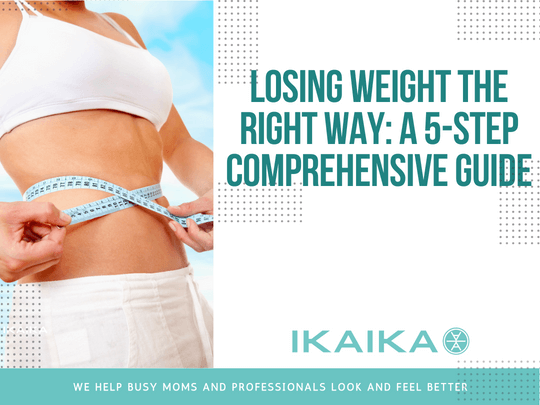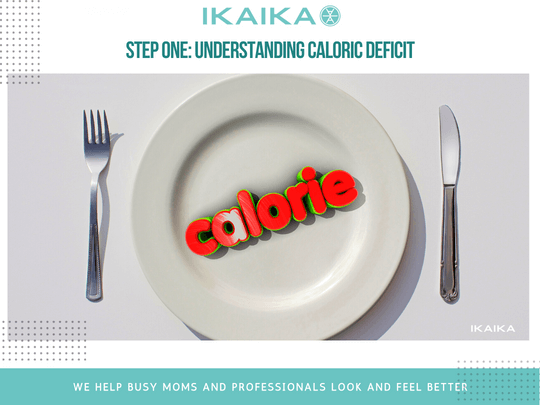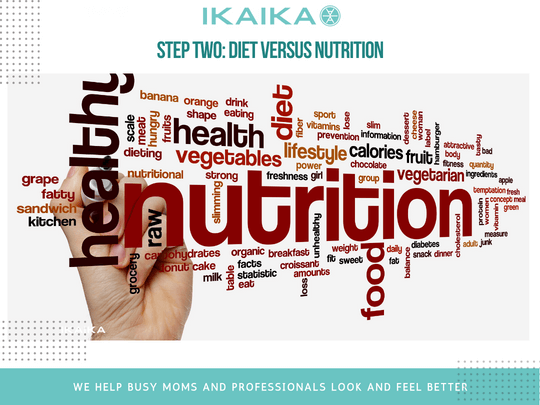
Losing weight can be a daunting task, especially when you don’t know where to start or how to make sure your efforts are sustainable and beneficial.
Thankfully, with the right approach, it can also be an empowering journey that allows you to live a healthier lifestyle. This guide will provide insight into five key steps for successful weight loss.
Table of Contents
Explanation of the importance of losing weight quickly and effectively
Losing weight is a commendable venture for both physical and mental health reasons. Not only does it reduce the burden on the joints, but weight loss also helps keep blood pressure and cholesterol levels in check.
For anyone looking to build healthy habits and improve overall well-being, losing weight quickly and effectively can be an empowering way of life.
From dedicated dietary changes to creating an exercise plan, there are many different strategies for success when it comes to weight loss.
The key is finding one that works for you, has achievable goals in place, and provides timely rewards so that you stay motivated to continue working hard towards your goals.
Overview of losing weight quickly and effectively
Losing weight quickly and effectively can be a daunting challenge. With proper direction and discipline, however, losing weight does not have to be an impossible dream.
While achieving healthy weight loss requires time, effort, and consistency, the rewards are great; better health, increased energy levels, and improved self-confidence are just some of the benefits associated with successful weight loss.
To reach your weight loss goals in the most efficient manner possible, develop specific strategies that focus on building healthy lifestyle habits while maintaining a positive attitude throughout the process.
Choose meals that are rich in fiber and protein while minimizing sugar and processed ingredients, exercise daily to keep the metabolism going, and prioritize adequate sleep to give the body plenty of opportunity to reset each day. With these tips in mind and a clear vision in hand, anyone can achieve their weight loss goals quickly and effectively.
Step One: Understanding Caloric Deficit

Losing weight is a goal for many, but understanding the right approach is key to successful results. Step one towards losing weight success is understanding caloric deficit or calorie balance.
In simple terms, a caloric deficit means taking in fewer calories than you are burning each day. This causes your body to burn stored energy reserves (fat) and leads to losing weight.
To ensure health safety it’s important to maintain good nutrition while following the caloric deficit approach and always speak with a healthcare professional before beginning any weight loss program.
Once you understand the concept of caloric deficit, adjusting diet and activity levels will be easier for your weight-loss goals.
Definition of Caloric Deficit
A caloric deficit is a weight loss method that involves reducing one’s daily calorie intake to lose weight.
When someone is looking to make healthier lifestyle choices, adopting a caloric deficit can help jump-start weight loss goals by creating an energetic balance and making sure the body is receiving fewer calories than it’s expending. In this way, the body must draw from existing stored fat to provide the needed energy for life-sustaining processes resulting in losing weight.
It’s important to remember that although caloric deficits are necessary for weight loss, too much of a caloric deficit can have adverse effects on health such as physical exhaustion and reduced mental performance.
Therefore, using a proper nutrition plan designed by a dietician or medical specialist along with regular physical activity should be used in conjunction with any incremental strategy towards losing weight.
How to create a Caloric Deficit
Creating a caloric deficit is an essential part of losing weight. It begins with understanding how much food you need to maintain your weight and then adjusting that amount accordingly.
The key is to create a small difference between the energy consumed through food and the energy burned off through exercise.
With smaller meals, regular physical activity, and staying away from unhealthy food choices- an individual can effectively create this caloric deficit, which will eventually lead to losing weight.
Additionally, creating a caloric deficit also has health benefits beyond weight loss such as helping strengthen bones and muscles, regulating hormone levels, and even aiding digestion.
Importance of creating a Caloric Deficit for losing weight
Establishing a caloric deficit is an important part of weight loss.
A caloric deficit means consuming fewer calories than you expend, so your body has to turn to stored energy reserves such as fat for fuel. While programs designed towards losing weight may focus on exercise weight loss is 80 percent about nutrition – what you eat and how much- and 20 percent about physical activity.
For most people, creating a healthy caloric deficit allows for sustainable weight loss that can result in improved health outcomes over time.
From eating high-fiber, low-calorie foods to tracking calories burnt through regular exercise, it’s important to be aware of the part that a caloric deficit plays in losing weight successfully.
Step Two: Diet Versus Nutrition

Losing weight is more than a number on the scale; true weight loss should be sustainable and focus on nourishing one’s body.
Step two in losing weight should therefore focus on optimal nutrition, rather than just dietary restriction. Quality food choices will result in better energy levels, improved overall mental and physical health, and weight loss that can last over time.
Replacing calorie-dense processed foods with nutrient-rich whole foods will not only help you reach your weight-loss goal faster, but it will also improve your long-term health prospects.
Although there are millions of diets out there that can help you in your weight-loss journey, the key to success lies in creating a balanced diet that meets all of your individual nutritional needs.
The role of diet in Losing Weight
Diet plays a major role when it comes to weight loss and losing weight healthily. Healthy dietary habits such as cutting out sugary processed foods, increasing intake of fresh fruit and vegetables, replacing starchy carbs with low GI alternatives, and reducing portion sizes are all beneficial when it comes to weight loss.
Regularly drinking enough water helps flush out toxins; this ensures that our bodies still operate at their optimum level while trying to lose weight.
Additionally, limiting stress triggers is also helpful in losing weight; much like good food choices, recognizing your stress levels can help you achieve your weight loss goals. Making the right dietary choices and adopting an overall healthy lifestyle will ensure weight loss success.
The role of nutrition in weight loss
Nutrition plays an invaluable role in losing weight, as it is essential to providing your body with the fuel it needs to sustain energy and maintain a healthy metabolism.
Professional nutritionists can provide insight on how to manage your diet to achieve your desired results while keeping yourself balanced and energized.
Losing weight isn’t easy and proper nutrition plays a critical role in helping you keep up the momentum needed to stay positive throughout the entire process. Practicing proper nutritional habits will help set you on the path toward a healthier lifestyle.
Choosing nutrient-dense, low-calorie foods
Deciding to choose nutrient-dense, low-calorie food is an important step in losing weight and overall health.
As hard as it can be to make wise decisions when the process of losing weight has already begun, focusing on nutrient-dense, low-calorie items like fruits, vegetables, and lean proteins can help us stay full longer and keep cravings at bay.
Incorporating these types of foods into meals can go a long way toward weight loss success; even small steps can lead to big changes over time.
Learning what types of food are both low-calorie and full of nutrients will serve you well in your weight loss journey.
The choices we make today affect our tomorrow; choosing nutrient-dense foods will leave you feeling energetic, nourished, and empowered!
Limiting intake of sugary and fatty foods
A professional, insightful, and positive approach to limiting the intake of sugary and fatty foods is essential for healthy living.
It is important to consider how certain foods can also contribute to not only overall physical health but also psychological well-being.
By acknowledging the relationship between food with both, we can come up with creative solutions that will have a lasting positive impact on our lives.
The key to success is in our attitude: by looking at these changes as building blocks instead of limitations, it will be easier to motivate ourselves and maintain healthy habits.
Reducing portion sizes
Reducing portion sizes can have multiple positive impacts on our overall health, especially when losing weight is part of the goal.
When we reduce the amount of food we eat, we are giving our bodies a break from digesting excess calories.
Making small changes over some time, such as cutting out an extra item or decreasing serving size, encourages weight loss in healthy ways that benefit us beyond weight management.
Reminding ourselves to be mindful while eating and knowing what balanced portions look like at meals provides an effective approach to weight loss while being conscious of healthful eating habits.
Ultimately reducing portion size can positively impact in losing weight and offer more excellence in overall healthiness.
Step Three: Exercise & Physical Activity

The third step to losing weight is exercise and physical activity. A healthy balance of intensity and frequency of your chosen physical activities must be maintained to safely reach weight loss goals.
Taking on a regular exercise routine can provide many health benefits such as improved cardiovascular health, strengthen bones, and increased muscle mass.
When incorporating physical activity into losing weight regimes, it’s important to choose activities you enjoy so you can stick with them long-term.
From hitting the gym to just going for a leisurely jog around the park, there are many different forms of exercise available that can kickstart weight loss journeys and ensure lasting results.
The role of exercise in weight loss
Exercise is an essential element of a successful weight loss plan. When combined with healthy eating, physical activity can have a significant impact on overall health and well-being.
Professionals recommend that adults should be engaging in moderate to vigorous exercise for at least 30 minutes per day five days a week.
This could include walking, running, swimming, or any other type of aerobic exercise as well as strength training. Doing this regularly can not only help with losing weight but also improve mood, increase energy levels, and lower the risk of heart disease and diabetes.
By making physical activity an important part of your lifestyle, the chances of staying at a healthy weight are greater!
Aerobic exercises for Losing Weight
Aerobic exercises are known to be incredibly effective for weight loss, when practiced consistently and in combination with a sensible diet.
A professional who is knowledgeable in this subject may be able to advise on the most suitable type of aerobic exercise for achieving desired results.
Participating in activities such as running, swimming or cycling can improve both physical fitness and mental well-being while having an impact on calories burned and thus body composition.
Those who incorporate aerobic exercises into their routine will soon begin to feel more energized, enabling them to make healthier food choices for beneficial outcomes overall.
Resistance training for building muscle and boosting metabolism
Resistance training is an effective and professional way to build muscle and boost metabolism. When done correctly, it can provide many positive health benefits.
Research has shown that resistance training encourages long-term weight maintenance, as well as improving muscular strength and endurance.
Furthermore, increased muscle mass also helps to boost your body’s metabolic rate, helping with fat loss and improving overall health.
Therefore, regular resistance training is an insightful way to support healthy lifestyle goals by building muscle and increasing metabolic rate.
Finding an exercise routine you enjoy and can stick to
For many of us, it can be difficult to establish a regular exercise routine. But professional and personal development doesn’t have to be mutually exclusive—a positive exercise regimen can help promote and sustain both.
The key is finding a form of exercise that you truly enjoy, as it will make it easier to stick to this routine in the long run. And while professional advice is certainly helpful, no one knows yourself better than you do!
Experiment with different activities or environments until you find something that fits both you and your lifestyle; doing so will set you up for professional success while promoting good health and well-being.
Step Four: Mindset and Lifestyle Changes
Losing weight is not simply a physical challenge, it is also a journey of mental and lifestyle changes. Step Four of weight reduction requires individuals to reassess their mindset and make adjustments to their lifestyle if they are to achieve success. It can be useful to ask yourself why you want to lose weight and examine the behaviors that have held you back in the past.
These may include certain thought patterns such as feeling incapable or having an unhealthy relationship with food.
Taking deliberate steps towards changing these patterns of behavior so that weight loss becomes achievable through smaller, more sustainable acts will form the cornerstone of success for losing weight in the long term.
It is important to remember that looking after your health should always come first when considering weight loss goals, so foster a healthy relationship with yourself throughout this process.
Importance of being patient and consistent
Being patient and consistent is of utmost importance when it comes to weight loss or any health-related goal.
Research has proven that by limiting the number of drastic lifestyle changes, weight loss can be achieved effectively in the long run.
Eating right, exercising regularly, and not getting discouraged during the journey are key factors to success.
Remind yourself that this process has no finish line, as there is always room to improve your diet and exercise goals to maintain a healthy weight.
Making it a habit to keep patience and constancy is essential as it gives you the best opportunity in reaching your weight loss goals while maintaining your mental and physical well-being.
Focus on overall health and well-being
Focusing on overall health and well-being should be a priority for everyone. From weight loss to exercise, eating healthy to drinking plenty of water, all these different factors contribute to creating a healthier lifestyle.
What many people don’t realize is that losing weight is just one aspect of having optimal health; mental and emotional health also play a critical role in creating happy and fulfilled lives.
Regularly engaging in activities like yoga or mindfulness can help reduce stress levels, clear the mind, and maintain both physical and psychological balance.
Allowing weight loss to be just one part of an overall journey towards better health contributes to an approach that looks at body, mind, emotions, and spirit – ultimately leading to greater overall well-being.
Making sustainable lifestyle changes
Making sustainable lifestyle changes is essential to weight loss and maintaining a healthy weight. It’s one thing to lose weight temporarily through calorie restriction or fad diets, but the key is to make meaningful, long-term changes that can be incorporated into daily routines.
Developing healthier daily habits such as eating whole foods, getting regular exercise, and staying hydrated are excellent starting points for consistently improving one’s weight and overall well-being.
Making small adjustments to one’s habits over time collectively leads to greater success than attempting larger lifestyle overhauls in a single day.
Start taking proactive steps toward weight loss today with sustainable lifestyle choices!
Avoiding fad diets and rapid weight loss
Weight loss can often seem like a daunting challenge that leads many towards fad diets and rapid weight loss plans.
However, taking a long-term approach to weight loss is the healthiest way to go about it, focusing on slow and steady progress without falling for short-term trends.
Losing weight should be viewed as a lifestyle rather than a sprint—eating healthy foods, cutting out excess sugar and salt, and getting plenty of exercise are all important components of weight loss that will help you reach your goals in the long run.
Keeping track of your progress with weight measurements and nutrition tracking are ways to keep yourself held accountable throughout the journey that can encourage positive results over time.
Step Five: Making Lifestyle Changes Last Long Term!
Successful weight loss isn’t about quick fixes or fad diets; instead, it requires making sustainable changes that become habits over time so results last long term!
Learning new recipes or meal prepping ahead of time ensures that healthy meals are easy options no matter how busy life gets while keeping track of progress via journaling or photographing allows us all to look back at both successes and accomplishments throughout our journeys thus far!
Also finding ways to stay active outside the gym such as taking breaks from work for walks around the block refreshes both mind and body alike!
Finally, remember that everyone moves at their own pace so taking things one step at a time helps prevent burnout which often occurs when trying too hard too soon – small steps add up over time!
Conclusion
Losing weight doesn’t have to be an overwhelming process – following these five steps will help set you up for success by creating realistic expectations regarding calorie deficits as well as emphasizing proper nutrition choices versus simply dieting to get results quickly without sacrificing long-term sustainability due to inadequate nutrient intake.
Additionally, making sure exercise is consistent – regardless if done inside or outside traditional gym settings – helps accelerate progress while mindset shifts remain pivotal points throughout entire journeys!
Lastly, lifestyle changes should last long-term through meal planning, tracking, remaining active, celebrating successes, and having support systems! Taking these actions together leads to lasting transformations!
Summary of the best way to lose weight quickly and effectively
Losing weight quickly and effectively requires dedication and motivation. Establishing a healthy eating plan that consists of balanced, nutrient-rich meals is the foundation for weight loss success.
Simultaneously, it is important to engage in physical activity regularly. Incorporating a variety of activities such as weightlifting, jogging, and swimming into one’s routine will ensure full body exercises and maximize weight loss potential.
Tracking your progress via weight logs, fitness journals, or using mobile apps can help identify which elements of your weight loss plan are working best for you.
Lastly, it is essential to be patient with yourself; weight loss does not happen overnight. With consistency, focus, and commitment utilizing these strategies–eating healthy and staying active–one to can expect to reach weight loss goals promptly while also establishing positive health habits that will last a lifetime.
Final thoughts and advice for achieving weight loss goals
Losing weight quickly and effectively requires dedication and motivation. Establishing a healthy eating plan that consists of balanced, nutrient-rich meals is the foundation for weight loss success.
Simultaneously, it is important to engage in physical activity regularly. Incorporating a variety of activities such as weightlifting, jogging, and swimming into one’s routine will ensure full body exercises and maximize weight loss potential.
Tracking your progress via weight logs, fitness journals, or using mobile apps can help identify which elements of your weight loss plan are working best for you.
KAIKA Fitness is a gym in Durham NC dedicated to providing personalized fitness programs to busy moms and professionals.
IKAIKA Fitness strives in providing personalized programs that are safe, fast-paced, and efficient so busy moms and professionals can get back on track with their life goals – whether it’s exploring new places or just taking care of themselves mentally by seeking adventure through the activity!
We provide a safe, flexible, and effective way to help you reach your fitness goals.
Read what our members are saying about us, and how satisfied they are with the results through our Google Reviews.
We use functional movements along with customized nutrition plans so that we can get the most out of each workout for optimal results – it’s all about having fun while achieving success!
Schedule your FREE No-Sweat Intro so that we can learn about your goals, and help you reach them.
The best way to get in shape and healthy is by joining IKAIKA Fitness. Whether you want a quick workout or are looking for more of an intense experience, this place has something that will suit your needs! So don’t miss out on the opportunity- join now through HERE.
So don’t miss out on this opportunity to get fit and healthy and find out why IKAIKA is on its way to becoming the best gym in Durham. If you do not believe us, please take a minute to read our Google Reviews HERE.
So, what are you waiting for? Book your FREE No-Sweat Intro today!
References
- Effect of exercise intensity on abdominal fat loss during calorie restriction in overweight and obese postmenopausal women: a randomized, controlled trial
- Effects of a High vs Moderate Volume of Aerobic Exercise on Adiposity Outcomes in Postmenopausal Women: A Randomized Clinical Trial
- Effect of aerobic exercise training dose on liver fat and visceral adiposity
- A dose-response relation between aerobic exercise and visceral fat reduction: systematic review of clinical trials
- Greater fructose consumption is associated with cardiometabolic risk markers and visceral adiposity in adolescents
- Fructose Consumption: Considerations for Future Research on Its Effects on Adipose Distribution, Lipid Metabolism, and Insulin Sensitivity in Humans
- Role of Dietary Fructose and Hepatic De Novo Lipogenesis in Fatty Liver Disease
- Added fructose: a principal driver of type 2 diabetes mellitus and its consequences
- Fructose-containing sugars and cardiovascular disease
- Stress-induced cortisol response and fat distribution in women
- Shaping the stress response: interplay of palatable food choices, glucocorticoids, insulin and abdominal obesity
- Minireview: glucocorticoids–food intake, abdominal obesity, and wealthy nations in 200
- Intake of macronutrients as predictors of 5-y changes in waist circumference
- Protein intake is inversely associated with abdominal obesity in a multi-ethnic population
- Quality protein intake is inversely related with abdominal fat
- Alcohol drinking patterns differentially affect central adiposity as measured by abdominal height in women and men
- Relationship of abdominal obesity with alcohol consumption at population scale
- Trans fat diet induces abdominal obesity and changes in insulin sensitivity in monkeys
- Metabolic implications of dietary trans-fatty acids
- Dietary fat intake and risk of coronary heart disease in women: 20 years of follow-up of the nurses’ health study
- Dietary intake of trans fatty acids and systemic inflammation in women
- Lifestyle Factors and 5-Year Abdominal Fat Accumulation in a Minority Cohort: The IRAS Family Study
- Dietary fiber decreases the metabolizable energy content and nutrient digestibility of mixed diets fed to humans
- Viscosity as related to dietary fiber: a review
- Normal-Weight Central Obesity: Implications for Total and Cardiovascular Mortality
- Why Visceral Fat is Bad: Mechanisms of the Metabolic Syndrome
- 19 Effective Tips to Lose Belly Fat